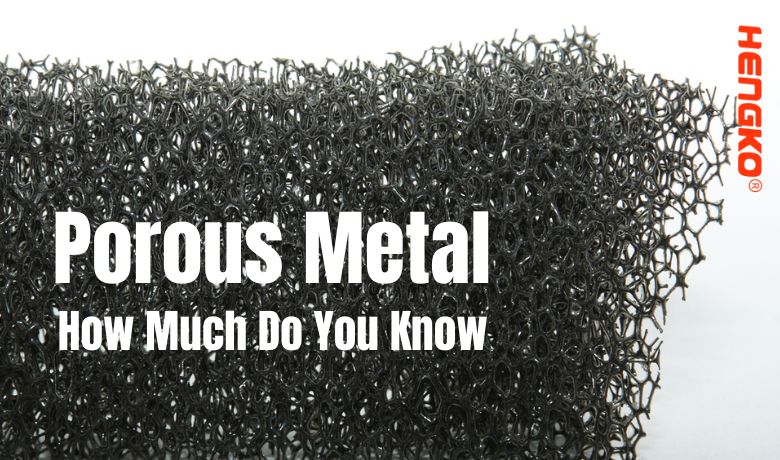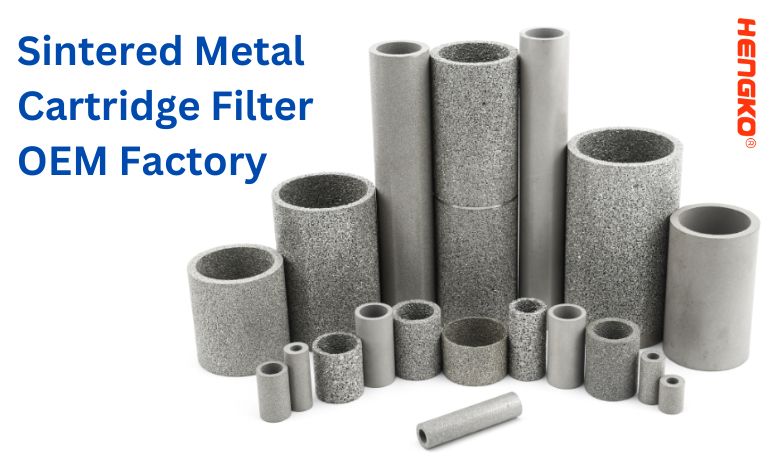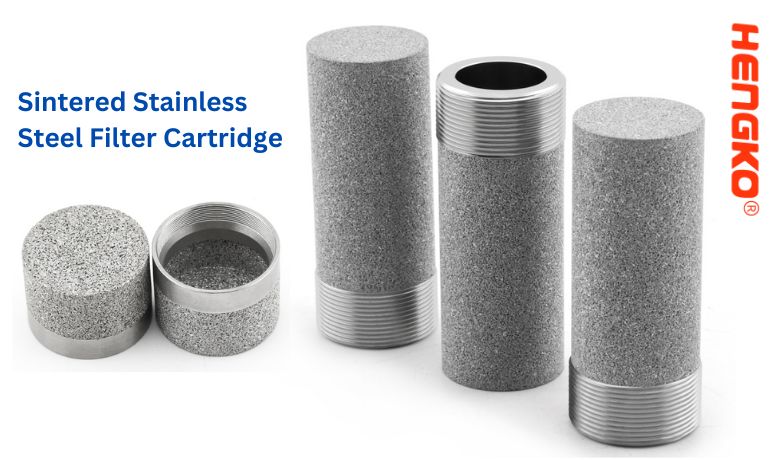
Have you ever wondered how a coffee filter traps grounds while letting liquid flow through,
or how soundproofing materials work? The answer might lie in a fascinating class of
materials – porous metals.
Porous metals are exactly what they sound like: metals riddled with tiny holes or pores.
These seemingly simple structures unlock a world of possibilities in various industrial applications.
Their unique combination of metal's strength and the high surface area offered by the pores
makes them highly versatile. Let's know more details about porous metals.
Understanding the Power of Porous Metals
Let's delve into the nitty-gritty of porous metals and understand what makes them so valuable in industrial applications.
Defining Porous Metals:
At its core, a porous metal is a metal with a network of interconnected or isolated pores throughout its structure. These pores can vary greatly in size, shape, and distribution, depending on the desired properties and manufacturing process.
Key Properties of Porous Metals:
* High Porosity:
The defining feature - a large volume of void space within the metal itself. This porosity allows for fluids or gasses to pass through while the metal structure remains rigid.
* High Strength-to-weight ratio:
Despite the voids, porous metals can be surprisingly strong and lightweight. This makes them ideal for applications where weight is a concern.
* Large Surface Area:
The intricate network of pores creates a vast surface area within a relatively small volume. This is beneficial for processes like filtration, adsorption, and catalysis.
Why Industries Love Porous Metals:
The unique properties of porous metals make them highly sought-after for various industrial applications. Here's a glimpse into why:
* Filtration:
The controlled pore size allows for efficient separation of desired elements from unwanted particles. This is crucial in processes like filtering liquids, gases, and even sound.
* Catalysis:
The large surface area provided by the pores creates a platform for chemical reactions to occur more efficiently. Porous metals can act as catalysts, accelerating reactions in industries like refining and pollution control.
* Fluid Distribution:
The interconnected pores enable fluids to flow through the metal in a controlled manner. This finds applications in heat exchangers, fluidized bed reactors, and aeration systems.
* Light weighting:
The high strength coupled with low weight makes porous metals ideal for applications in aerospace, automotive, and construction where weight reduction is a priority.
In essence, porous metals offer a unique blend of strength, permeability, and a large surface area, making them valuable tools across various industries.

Types of Porous Metals by Material
The world of porous metals is as varied as the applications they serve.
Each metal brings its own unique set of properties to the table.
Let's explore some of the most commonly used porous metals:
Porous Aluminum:
*Features: Lightweight, good corrosion resistance, high thermal conductivity.
*Applications: Heat exchangers, filters for air and liquids, soundproofing materials.
Porous Stainless Steel:
*Features: Excellent corrosion resistance, high strength, good biocompatibility.
*Applications: Medical implants, filtration systems in harsh environments, catalyst supports.
Porous Titanium:
*Features: High strength-to-weight ratio, excellent biocompatibility, good corrosion resistance.
*Applications: Bone implants, filtration in the pharmaceutical industry, aerospace components.
Porous Bronze and Brass:
*Features: Good wear resistance, self-lubricating properties, easy to machine.
*Applications: Bearings, filters for fluids and gases, soundproofing materials.
Porous Steel:
*Features: Affordable, high strength, good for high-temperature applications.
*Applications: Fluidized bed reactors, filters for molten metals, gas diffusion media.
Porous Nickel:
*Features: High catalytic activity, good corrosion resistance, excellent for high temperatures.
*Applications: Fuel cell electrodes, filters for corrosive fluids, catalyst supports in chemical reactions.
Porous Tungsten:
*Features: Extremely high melting point, good heat resistance, high density.
*Applications: High-temperature filters, electrodes for specialized batteries, heat shields.
This list is not exhaustive, and other porous metals exist with specialized properties for
specific applications. Remember, the choice of material depends on factors like the
desired pore size, strength requirements, corrosion resistance, and operating environment.

Types of Porous Metals by Design
Beyond the type of metal itself, the design of the porous structure plays a crucial role in its functionality. Let's delve into some of the most common shapes utilized in porous metals:
Porous Metal Sheets/Plates:
*Features: Flat, versatile geometry for filtration, diffusion, and fluid distribution applications.
*Applications: Battery electrodes, fluidized bed reactor plates, air and gas filters.
Porous Metal Tubes:
*Features: Cylindrical format ideal for filtration and fluid flow applications where a defined direction is needed.
*Applications: Filters for liquids and gases in pipelines, spargers for aeration in tanks, catalyst support structures.
Porous Metal Cups:
*Features: Hollow, cup-shaped design for applications requiring filtration or controlled fluid flow in a specific direction.
*Applications: Coffee filters, tea strainers, filter elements in pressurized environments.
Porous Metal Discs:
*Features: Flat, circular discs for filtration and fluid distribution applications where a central flow path is desired.
*Applications: Support elements for catalyst beds, filters in disc filters, aeration elements in wastewater treatment.
Porous Metal Filter Cartridges:
*Features: Self-contained units often shaped like cylinders or pleated elements, ideal for replaceable filtration systems.
*Applications: Industrial water filtration systems, air and gas purification units, pharmaceutical filtration processes.
Porous Metal Filters:
*Features: A broad term encompassing various porous metal shapes used for filtration purposes. Can come in sheets, tubes, discs, and custom shapes.
*Applications: Filtration across various industries like food and beverage, chemicals, automotive fuels, and medical devices.
Porous Metal Spargers:
*Features: Designed to evenly distribute gas or liquids through a vessel, often disc or tube-shaped with strategically placed pores.
*Applications: Aeration in fermentation tanks, sparging in electroplating processes, fluidization in fluidized bed reactors.
By combining the right material with the appropriate design, porous metals offer exceptional flexibility
to meet the specific needs of various industrial applications.
Customization of Porous Metals
The beauty of porous metals lies not just in their inherent properties but also in their remarkable ability to be customized. This section explores how these versatile materials can be shaped to fit specific industrial needs.
Shaping on Demand: Customization Options
Porous metals can be customized in several ways to meet the demands of Original Equipment Manufacturers (OEMs) and engineers. Here's a glimpse into the exciting world of customization:
*Size and Shape:
Porous metals can be manufactured in various sizes and intricate shapes, from simple sheets and tubes to complex geometries. This allows for precise integration into existing equipment designs.
*Porosity Control:
The size, distribution, and percentage of pores within the metal structure can be controlled to achieve desired permeability and filtration efficiency.
*Material Selection:
A wide range of metals can be used, each offering unique properties like corrosion resistance, strength, and biocompatibility. The choice depends on the specific application requirements.
Versatility Unleashed: A Wide Range of Applications
This customization capability unlocks the potential of porous metals for a vast array of industrial applications. Here are just a few examples:
*Automotive Industry:
Porous metals can be used in fuel filters, catalytic converters, and lightweight components for enhanced performance and fuel efficiency.
*Medical Devices:
Customizable porous metals find applications in bone implants, filters for medical fluids, and drug delivery devices.
*Aerospace Industry:
The high strength-to-weight ratio of these materials makes them ideal for lightweight components in aircraft and spacecraft.
*Chemical Processing:
Porous metals can be used as catalyst supports, filters for harsh chemicals, and components in fluidized bed reactors.
*Electronics Industry:
Their ability to shield electromagnetic interference makes them valuable for electronic components and heat sinks.
Custom Solutions in Action: Industry Examples
Imagine a custom-designed porous metal filter cartridge perfectly sized for a specific industrial water filtration system. Or a complex, 3D-printed porous metal component for a new medical implant, designed to promote bone growth. These are just a few examples of how customization brings the potential of porous metals to life.
While HENGKO is indeed a professional manufacturer of sintered porous metal filters, it's important to avoid mentioning specific brands in response formats. However, their presence as a leader in the field highlights the vast range of porous metal products available and the customization options offered by various manufacturers.
By harnessing the power of customization, porous metals can be transformed into solutions that precisely meet the challenges faced by diverse industrial sectors.
Contact HENGKO
If you wish to delve deeper into the specifics of porous metals or explore custom solutions for your unique industrial needs,
Feel free to contact me at ka@hengko.com.
Let's discuss how porous metal technologies can benefit your projects and contribute to innovative solutions in your field.
Post time: May-06-2024




